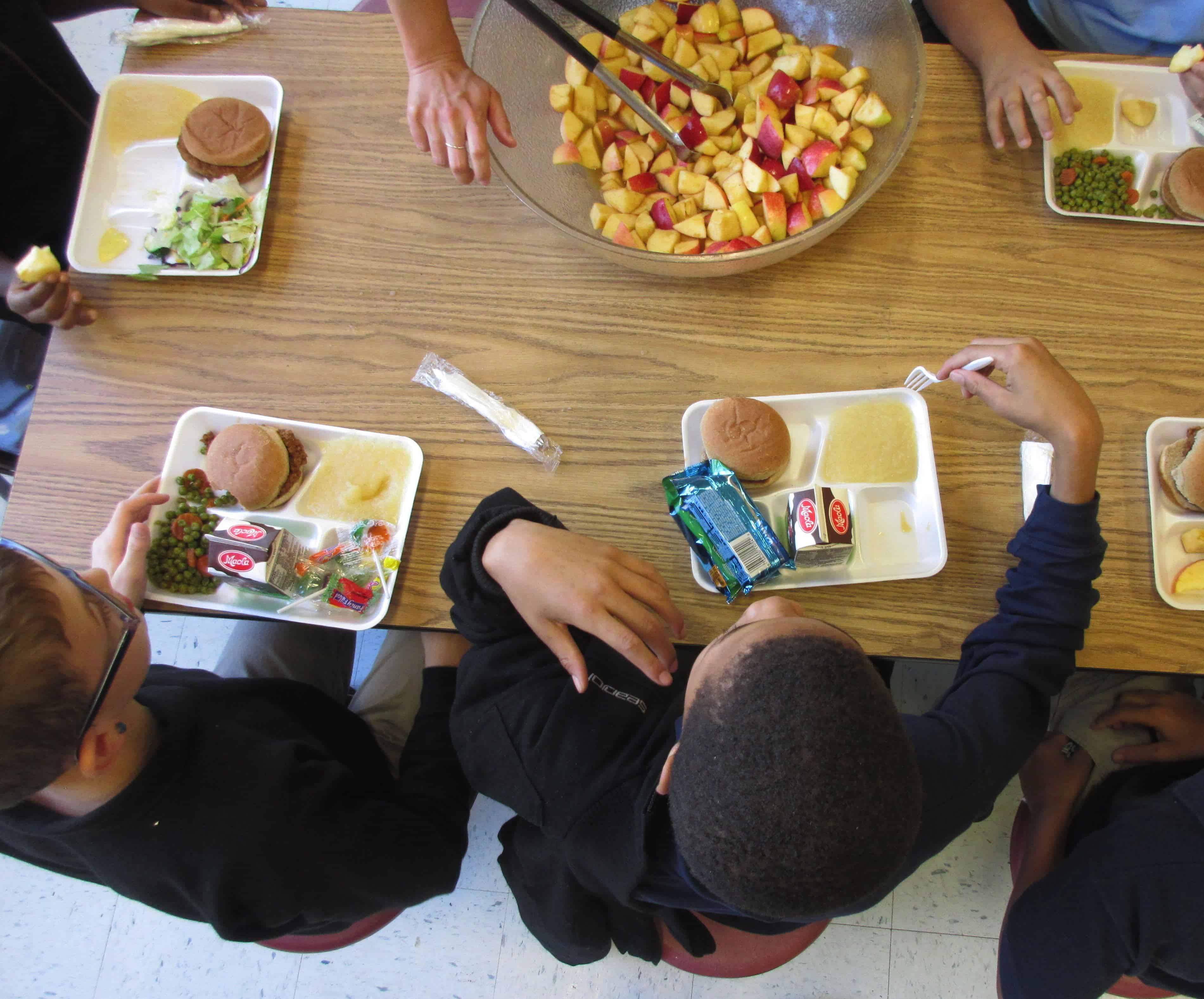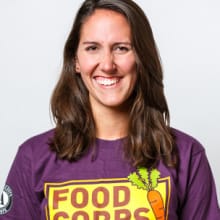It was 10:00 a.m. in the South Warren Elementary cafeteria. Ms. Bullock, Ms. Kearney, Ms. Jones, and I were busy slicing North Carolina apples in preparation to dole them out to students for our apple event.
“The kids are just going to love this,” Ms. Bullock smiled and said. We chopped half a bushel of apples, then the ladies sprung into action to get the cafeteria line ready for the first crew of students that were making their way down the hallway toward the cafeteria.
The bulletin board in the cafeteria was plastered with students’ artwork that celebrated October as Apple Month: apples growing on branches, apples smiling with pearly white teeth, apples with happy worms springing out of them. I stood at the end of the cafeteria line, donning a hair net and gloves with the giant bowl of chopped red, green, and yellow apples, waiting for the onslaught of 180 students coming our way.
“When there’s something different on the menu line or in the cafeteria, I see these kids get excited,” Ms. Kearney, cafeteria manager, told me over lunch one day. “I like the way we’ve done it where we had samples and we were handing it out to kids.”
The samples Ms. Kearney was referring to is part of a farm-to-school strategy called a “taste test,” during which students get to try a featured dish, fruit, or vegetable in their school cafeteria, then vote on what they think about it. It’s a unique way to encourage kids to interact with what’s on their lunch tray, and the food service staff at South Warren Elementary are a huge fan of the process.
“I think they enjoy that and get excited. The kids, they talk about those events. They like it because it’s something special.”
Enjoyment and excitement certainly abounded during our apple taste test. Grades pre-Kindergarten through fifth cycled through the cafeteria, enthusiastically crunching on apples.
“Can I eat the whole bowl?” asked a third grader, suddenly an overzealous apple eater. After the students tried their apple sample, they got a sticker saying “I tried local apples!” They voted on whether they “loved” the apples, “liked” them, or just “tried” them. The voting process allowed students’ voices to be heard, while also giving the food service staff an idea of their students’ preferences.
The apples weren’t the first fresh, local produce in the cafeterias of Warren County schools. Working Landscapes, a nonprofit dedicated to creating more sustainable livelihoods for people in the Warren County region, has been working with three local farmers for three years to get fresh collard greens and cabbages grown and processed in the county, then distributed to the school cafeterias for consumption.
Each year, 2,500 students in Warren County are served collard greens and cabbage in the cafeteria that have been grown right in the county.
“I love the fact that it was grown right here. It’s so fresh, and you can taste that,” said Ms. Jones, child nutrition assistant at South Warren Elementary. The food service staff at South Warren refers to themselves as “old-school” cooks. Sometimes, they say, it feels like their old-fashioned style of cooking is at odds with the USDA regulations for the school lunch program. The cooks also expressed a common concern: that kids are hesitant to eat vegetables on their lines that don’t look or taste like what they see on their dinner plates at home.
The collard greens, however, strike a harmonious balance in the cafeteria for the staff. They are fresh and healthy for the students, they are locally grown, and the cafeteria staff enjoys cooking and serving them. As for the kids, “they love the collard greens—they eat those right on up. It’s something that they know they like,” says Ms. Kearney.
During the apple taste test, I approached one table of fifth-grade girls and handed out some samples. There was one student who was absolutely sure that she hated apples. I asked her friends, “What do y’all think? Think she should try at least one bite?” They all nodded and encouraged her to take a bite. She wouldn’t budge, and was very vocal about how much she disliked apples. I let her know that these apples were particularly fresh and crunchy, and that I had a feeling she was going to love them. Then I floated to the next table of students.
I was cleaning up once the taste test had ended and the cafeteria had cleared out. The hesitant fifth grader came to me and sheepishly asked for one more bite of apple. I willingly handed her one, along with a high five and a smile, and she went on her way, proudly wearing her “I tried local apples” sticker. Yet another student became an apple eater; all it took was a little help from her friends. After clean up, Ms. Bullock, Ms. Kearney, and Ms. Jones were all smiles, laughter, and hugs.
“That was fun! The kids really enjoyed that, Miss Rachel!” said Ms. Jones. “We’ll be hearing them talking about this in the cafeteria for a while now.”

